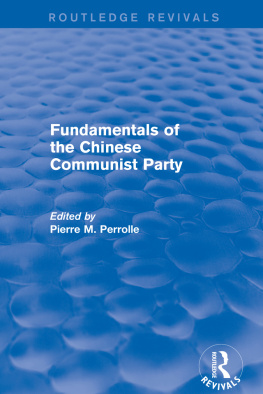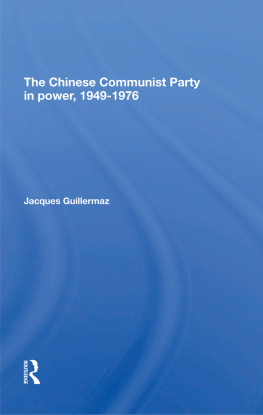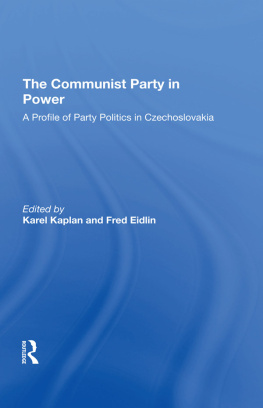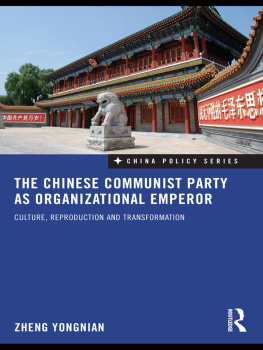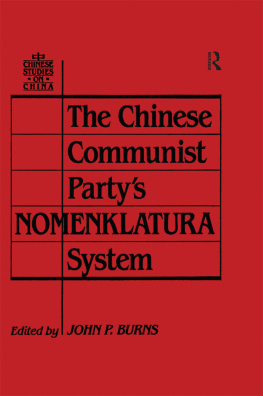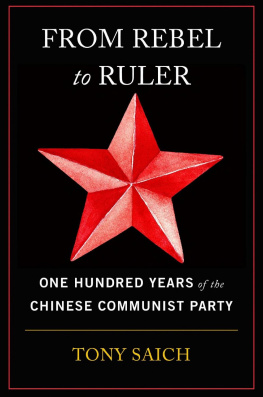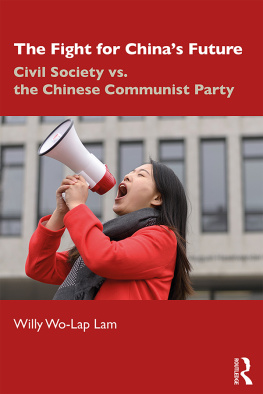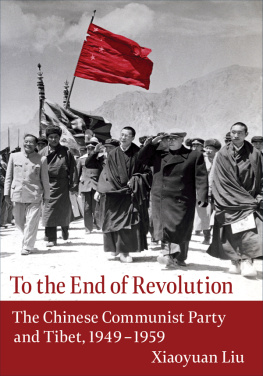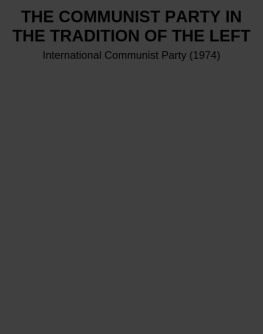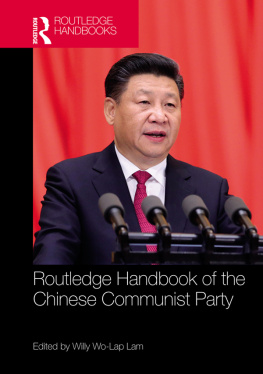Pierre M Perrolle - Fundamentals of the Chinese Communist Party
Here you can read online Pierre M Perrolle - Fundamentals of the Chinese Communist Party full text of the book (entire story) in english for free. Download pdf and epub, get meaning, cover and reviews about this ebook. year: 2017, publisher: Routledge, genre: Politics. Description of the work, (preface) as well as reviews are available. Best literature library LitArk.com created for fans of good reading and offers a wide selection of genres:
Romance novel
Science fiction
Adventure
Detective
Science
History
Home and family
Prose
Art
Politics
Computer
Non-fiction
Religion
Business
Children
Humor
Choose a favorite category and find really read worthwhile books. Enjoy immersion in the world of imagination, feel the emotions of the characters or learn something new for yourself, make an fascinating discovery.
- Book:Fundamentals of the Chinese Communist Party
- Author:
- Publisher:Routledge
- Genre:
- Year:2017
- Rating:4 / 5
- Favourites:Add to favourites
- Your mark:
- 80
- 1
- 2
- 3
- 4
- 5
Fundamentals of the Chinese Communist Party: summary, description and annotation
We offer to read an annotation, description, summary or preface (depends on what the author of the book "Fundamentals of the Chinese Communist Party" wrote himself). If you haven't found the necessary information about the book — write in the comments, we will try to find it.
Fundamentals of the Chinese Communist Party — read online for free the complete book (whole text) full work
Below is the text of the book, divided by pages. System saving the place of the last page read, allows you to conveniently read the book "Fundamentals of the Chinese Communist Party" online for free, without having to search again every time where you left off. Put a bookmark, and you can go to the page where you finished reading at any time.
Font size:
Interval:
Bookmark:

Fundamentals of the Chinese Communist Party
Translation and Commentary
A wide-ranging series of carefully prepared translations of books published in China since 1949, each with an extended introduction by a Western scholar.
The People of Taihang: An Anthology of Family Histories
Edited with an introduction by Sidney L. Greenblatt.
Fundamentals of the Chinese Communist Party
Edited with an introduction by Pierre M. Perrolle.
Shang Yang's Reforms and State Control in China
Edited with an introduction by Li Yu-ning.
The Early Revolutionary Activities of Comrade Mao Tse-tung
Edited by James C. Hsiung. Introduction by Stuart R . Schram.
The Rustication of Urban Youth in China: A Social Experiment
Edited by Peter J. Seybolt. Introduction by Thomas P. Bernstein.
Edited With an
Introduction by
Pierre M. Perrolle

First published 1976 by International Arts and Science Press, Inc
Reissued 2018 by Routledge
2 Park Square, Milton Park, Abingdon, Oxon OX14 4RN
711 Third Avenue, New York, NY 10017, USA
Routledge is an imprint of the Taylor & Francis Group, an informa business
Copyright 1976 by Taylor & Francis
No part of this book may be reprinted or reproduced or utilised in any form or by any electronic, mechanical, or other means, now known or hereafter invented, including photocopying and recording, or in any information storage or retrieval system, without permission in writing from the publishers.
Notices
No responsibility is assumed by the publisher for any injury and/or damage to persons or property as a matter of products liability, negligence or otherwise, or from any use of operation of any methods, products, instructions or ideas contained in the material herein.
Practitioners and researchers must always rely on their own experience and knowledge in evaluating and using any information, methods, compounds, or experiments described herein. In using such information or methods they should be mindful of their own safety and the safety of others, including parties for whom they have a professional responsibility.
Product or corporate names may be trademarks or registered trademarks, and are used only for identification and explanation without intent to infringe.
Publisher's Note
The publisher has gone to great lengths to ensure the quality of this reprint but points out that some imperfections in the original copies may be apparent.
Disclaimer
The publisher has made every effort to trace copyright holders and welcomes correspondence from those they have been unable to contact.
A Library of Congress record exists under LC control number: 75046228
From The China Book Project. Fundamentals of the Chinese Communist Party is a translation of Tang ti chi-ch'u chihshih , compiled by the "Fundamentals of the Party" Writing Group, Shanghai (Shanghai People's Press, 1974). Translated by Lloyd and Chung Richardson.
ISBN 13: 978-1-138-03741-0 (hbk)
ISBN 13: 978-1-315-17792-2 (ebk)
The editor wishes to acknowledge the contributions of Lloyd and Chung Richardson who drafted the translation of the Chinese text and of John K. Leung for his editorial assistance, while retaining the responsibility for any shortcomings in the final product. He also wishes to thank Douglas Merwin of IASP and Ying-mao Kau of Brown University for their guidance, support, and patient encouragement.
P. M. P.
March 1976
From 1966 to 1969 the large-scale political turmoil and intense conflicts of the Cultural Revolution in China shattered notions of institutional permanence and unshakable legitimacy that many analysts had come to associate with the Communist Party of China, which had ruled the People's Republic for over fifteen years. Just as the high-level bureaucrats of the Party were shaken from their complacency, it seemed for a time, from the outside, as though it could no longer be taken for granted that the Communist Party would continue to provide the institutional core for political leadership in China. ()
The purge of a limited number of individuals such as that of Kao Kang and P'eng Teh-huai in the 1950s was not a new phenomenon for students of communist political systems. But the wholesale criticism and removal of a large proportion of China's political elite, including such powerful Party leaders as Liu Shao-ch'i, P'eng Chen and Lo Jui-ch'ing, seemed to call into question the future of the Party itself as an institution. ()
Since 1969 the steps taken to rebuild the Party by a gradual reconstitution of Party committees at all levels and the gradual effacement of military power and of the revolutionary committees have made it clear that many observers of Chinese politics had overreacted in writing their obituaries of the Party. The ) The reappearance of numerous Party leaders and the current emphasis on production in economic policy certainly reinforce this view. Yet we should remain cautious of the facile conclusions which may flow from such assumptions and instead focus our attention on analyzing the changes and innovations which have been introduced in the Party since the Cultural Revolution.
Such changes are not easy to identify. Since the Cultural Revolution, the Ninth Party Congress in 1969 and Tenth Party Congress in 1973 ratified two new Party constitutions which are very different from the 1956 Constitution adopted by the Eighth Party Congress. () However, because both these constitutions are short and highly simplified in comparison with earlier ones, and because the accompanying reports on revision are also brief and superficial, analyses of the new constitutions alone are insufficient to carry out an assessment of recent changes in the character and functions of the Communist Party. Other materials must be sought to provide a basis for analysis.
Fundamentals of the Party (Tang ti chi-ch'u chih-shih), which we are translating and publishing here as Fundamentals of the Chinese Communist Party, was published by the Shanghai People's Press in 1974 and constitutes an important source of the type needed to study the revival of the Party. The book, which is aimed at young activists who seek to join the Party as well as being a primer for Party classes at the basic level, represents one of the most comprehensive and authoritative treatments to date of the fundamental characteristics, the theoretical basis, and the organizational principles of the Party after the Cultural Revolution. The fact that the book was prepared by an ad hoc writing group in Shanghai, a city of special political and ideological significance during the Cultural Revolution, where the powerful leaders and theoreticians Chang Ch'un-ch'iao and Yao Wen-yuan are based, may lend added significance to the document. ()
To fully appreciate the significance of Fundamentals of the Party, and of the 1973 Party Constitution on which it is a commentary, one must recognize the ephemeral character of the constitutions of both the Chinese Communist Party and the Chinese state. ()
The new 1973 Party Constitution has, of course, in the wake of Lin Piao's demise, deleted reference to Lin without substituting another specific successor to Mao. In spite of this, the new document ought not to be viewed as any more timeless than its 1969 predecessor. The 1973 Constitution is not intended for the indefinite and long-range future. It is fundamentally a statement of political directions in China following the Cultural Revolution and the Lin Piao affair. () Fundamentals of the Party clearly reflects a concern, in its dozens of references to the Cultural Revolution and to the Lin Piao affair, for the immediate implications of those events for the future role and tasks of the Party.
Font size:
Interval:
Bookmark:
Similar books «Fundamentals of the Chinese Communist Party»
Look at similar books to Fundamentals of the Chinese Communist Party. We have selected literature similar in name and meaning in the hope of providing readers with more options to find new, interesting, not yet read works.
Discussion, reviews of the book Fundamentals of the Chinese Communist Party and just readers' own opinions. Leave your comments, write what you think about the work, its meaning or the main characters. Specify what exactly you liked and what you didn't like, and why you think so.

